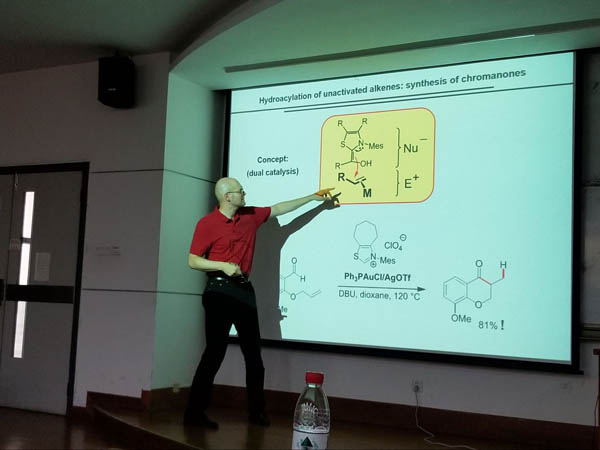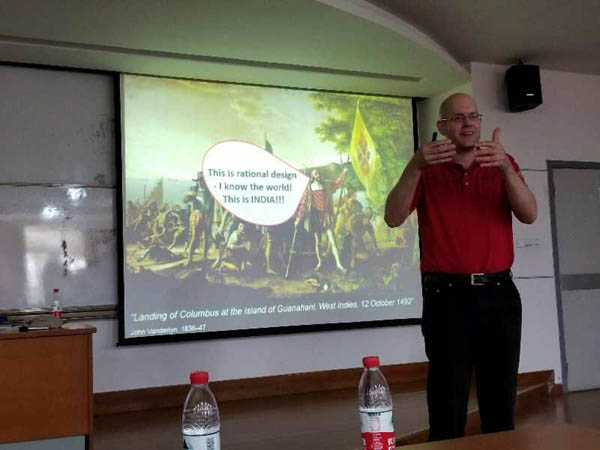On June 6, 2017,Prof. Frank Glorius from Westfalishche Wilhelms-Universitat Munster (Germany) visited our school and brought us a wonderful lecture, with the title“On Discovery in Catalysis”.
In the report, Prof. Glorius first introduced the wide application of catalysis. As we all know, the expected way to discover a new catalysis is rational design not experimental finding, so the collaborative work of artists and chemists is very important. Then he introduced the development and characteristics of the NHCs and divided the application of the NHCs into three parts:as organic catalyst,in metal complexes,on and in surfaces. NHCs working as organo-catalysts mainly used the special characteristic that when NHCs combined with the aldehydes, polarity umpolung happened. As well as that the structure of NHCs can be chiral,so it can be used for asymmetric catalysis. Many other asymmetric reactions can be achieved with the combination of metal and NHCs. In the second part, he introduced the Ru-NHCs-catalyzed asymmetric arene hydrogenation. The former work in this area focused on hydrogenation of bicyclic N-heterocycles. Before their work, only one homogeneous carbocycle reduction example which is not reactive for substituted compounds was known. Prof. Glorius group switched the phosphines ligands to NHCs and achieved the asymmetric hydrogenation of Quinoxalines. Based on this, they also developed a new catalytic system: chiral NHCs+ metal+ chiral ligand and achieved asymmetric hydrogenation of isocoumarines. In the part of NHCs on and in surfaces, Prof. Glorius introduced how to make an NHC move on the surface to satisfy the mobility required in the self assembled monolayers.
In the discussion section, the teachers and classmates asked questions enthusiastically, Prof. Glorius made detailed and deeply answer. We all appreciated his exciting lecture very much.(Written by Zhen Wang;Pictures from Xinhang Jiang and Qian Wu)


Brief introduction of Prof. Glorius:
Date of birth:1972
Position:Full Professor, Organic Chemistry, Westfalische Wilhelms-Universitat Munster (Germany)
Education:
1992–1997 Chemistry Diploma, Universitat Hannover (Germany)
1995–1996 Research with Prof. Paul A. Wender, Stanford University (USA)
1997–2000 PhD with Prof. Andreas Pfaltz, first at the Max-Planck-Institut (MPI) fur Kohlenforschung (Germany) and finally at the Universitat Basel, Basel (Switzerland)
2000–2001 Postdoctoral Fellow with Prof. David A. Evans, Harvard University (USA)
Professional associations:
2001–2004 Independent research (mentor Prof. Alois Furstner) at the MPI fur Kohlenfor-schung, Mulheim/Ruhr (Germany)
2004 Associate Professor, Philipps-Universitat, Marburg (Germany)
2007 Full Professor, Westfalische Wilhelms-Universitat Munster (Germany)
Current research interests:
Our research spans a wide range of different hot topics in catalysis. These include the design of sterically demanding N-heterocyclic carbenes (NHCs) and functional metal-organic frame-works (MOFs), challenging cross-coupling and C-H activation reactions, (asymmetric) organocatalysis, and the efficient formation of important heterocylic products. We strive to develop innovative new concepts in catalysis to facilitate the synthesis of important organic molecules and to make their production more environmentally benign.